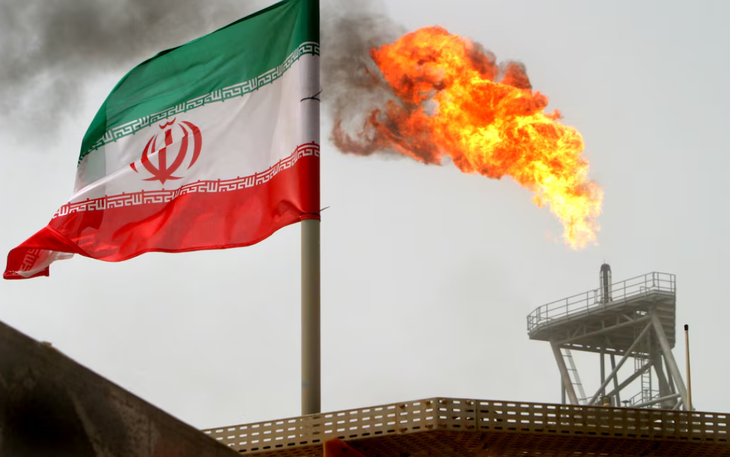
An oil rig with an Iranian flag - Photo: REUTERS
In a report released on the evening of June 13, the Agribank Securities (Agriseco) analysis team said that the global stock market, including Vietnam, could be affected in the short term by fluctuations in energy prices, logistics costs, and investor sentiment due to the escalation of the Israel-Iran war.
Israel attacks Iran, gold price, oil price, financial market fluctuates
Global stock markets mostly recorded declines after Israel's preemptive strike on Iran, Agriseco said.
In Vietnam, the market also recorded similar developments when at one point the index dropped by nearly 18 points, however the decline quickly narrowed, helping the VN-Index close at 1,315 points.
Meanwhile, WTI crude oil prices have jumped by 10%, to nearly $75/barrel - the highest level since January. The main reason comes from concerns about the risk of supply disruption, especially in the Strait of Hormuz - which accounts for about 20% of global oil flow.
At the same time, the price of gold also increased by more than 1%, surpassing the mark of 3,420 USD/ounce - approaching the highest level in history and is expected to fluctuate. The main reason comes from the wave of investors seeking safe assets in the context of escalating geopolitical tensions, increasing global economic risks and uncertainty in US trade policy.
In addition, Agriseco experts are concerned that the conflict between Iran and Israel could lead to disruptions in the global supply chain, as both countries play important roles in many manufacturing and export industries.
Iran is a major supplier of oil, fertilizers, chemicals and industrial metals. If the war disrupts exports through the Strait of Hormuz, oil prices could rise further, leading to higher shipping costs, domestic fuel prices and global manufacturing input costs.
Israel is home to many large chip factories, an important link in the global semiconductor supply chain. Accordingly, facilities of Intel, Nvidia, and Medtronic will face the risk of disruption to production and R&D.
The war has put production and research activities here at risk of serious disruption due to lack of manpower, insecurity and logistics disruption.
Indirect Impact on Vietnam: Be Cautious but Don't Panic
According to Agriseco, although the war between Iran and Israel could cause strong fluctuations in the global supply chain, Vietnam is not directly affected by trade with these two countries.
Specifically, export turnover from Vietnam to Iran and Israel accounts for a very small proportion, not among the main export markets.
At the same time, Iran and Israel are not Vietnam's main import sources of fuel, components, or essential goods.
"The conflict between these two countries does not directly affect Vietnam's trade flow. However, Vietnam may be indirectly affected through fluctuations in oil prices, shipping costs and input material prices from the world market," Agriseco experts said.
In addition, Agriseco experts are concerned that risk aversion could cause money to withdraw from the stock market. Direct and indirect investment capital could also leave markets near conflict zones.
If the situation escalates, rising energy prices threaten inflation, and interest rate cut plans by major central banks like the Fed or ECB could be slowed.
"The negative reactions from the world stock market can indirectly affect the Vietnamese stock market," said Agriseco experts. In the short term, concerns about the possibility of escalating conflicts can put pressure on the financial market.
However, Agriseco statistics based on historical data, when conflicts do not cause large-scale economic damage worldwide, financial markets do not record any significant declines and soon return to an upward trend shortly after.
Vietnam will not be much affected by the above event, because import and export activities to the Middle East are quite limited.
In addition, in the context of increasing geopolitical instability, international investors are looking for stability to diversify their supply chains away from high-risk areas, Vietnam can emerge as a relatively safe destination thanks to its stable political environment, according to Agriseco.
Stocks are affected by widespread psychology
Mr. Nghiem Sy Tien, analyst at KB Securities (KBSV), also said that the escalation of war between the two Middle Eastern countries does not have a direct impact on Vietnam's economy, because the proportion of import and export and FDI capital from the two countries is quite small.
“However, there will be indirect impacts related to inflation and exchange rates,” Mr. Tien predicted.
Explaining further, KBSV experts said that conflicts in the world's key oil supply region will push crude oil prices skyrocket, putting pressure on energy prices, transportation costs and affecting inflation.
In addition, according to Mr. Nghiem, geopolitical instability could prompt global investors to seek safe haven assets such as gold and USD. Although the DXY index has fallen sharply since the beginning of the year, the USD/VND exchange rate has still increased sharply, contrary to the general trend of currencies in the region, due to concerns about the impact of tariffs on export activities and FDI attraction.
If DXY reverses and increases again in the coming time, the exchange rate pressure will increase. Regarding the stock market, Mr. Nghiem believes that the conflict will trigger a negative psychological reaction in the global stock market, causing a correction in many types of financial assets. The Vietnamese stock market with a high level of correlation may also not be able to avoid negative impacts, although the level may be different from many major markets.
Source: https://tuoitre.vn/israel-tan-cong-iran-gia-dau-gia-vang-duoc-du-bao-tang-chung-khoan-viet-the-nao-20250613193434782.htm

































































































Comment (0)